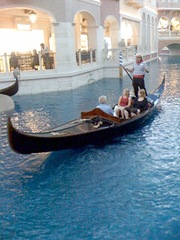Simulated Fine Dining
Capgras Delusion is a psychiatric syndrome that manifests itself in this way: one morning a person awakes to find that the people close to him have seemingly been replaced by exact duplicates, each a perfect impostor in every way, lacking only in authenticity. It can happen also that one so stricken gains a sense that he, himself, is a mere facsimile.
Perhaps this is something like waking in Las Vegas, where the simulacrum of reality has appropriated the original, engulfing it in the way that one snake might swallow another. Any preservation of serpentine morphology asserts itself as a mockery, where the joke is on you. And though in many ways this can be, perhaps inexplicably, an entertaining experience, I am always left feeling that, somehow, reality is just out of reach. You grab for it and your fingers slip through handfuls of anhydrous desert air.
My bewilderment overflows its vessel at the prospect of having a gondola ride in a shopping mall. Nonetheless, I urge you to visit the Venetian Hotel and Casino. Watch the passengers, a fascinating demographic spectrum, from grannies with kids to mischievous intoxicated business travelers, all bobbing along peacefully as they traverse the 100 meter length of a concrete pool, led by the operatic whooping of their 'gondolier,' which echoes through the cavernous shopping arcade. After such an observation, I challenge you to compound your own explanation. Is this a representation or is it a real experience? The answer, I suppose, is that it is a little of both, yet surely one's 'willing suspension of disbelief ' must soar to previously unattainable heights to overcome the brute fact that the actual tour, through dyed and heavily-chlorinated 'canal water,' occurs not at ground level, but on the second floor of this miraculous destination-attraction.
Is it not delectable to imagine an abandoned, primordial, subterranean level, concealed beneath the verity of Venice, and what treasures, in place of gaming tables and slot machines, would now lie crumbling amongst long-forgotten ghostly forms of ancient pelagic concretions? For my part, I'll wager that more than a few American tourists would happily lob chlorine pellets into that renowned, opaque Venetian broth, which has steeped nastily for many more generations than there has been a nation called "The United States of America."
Some related ideas can be found in an essay by Ada Louise Huxtable, from her 1997 book The Unreal America, where she deconstructs Las Vegas at some length in a chapter originally appearing in the NY Times, as "The Real Fake and the Fake Fake." Certainly I've unearthed a few of her ideas from my cranium here, however, in the intervening years since the publication of her book, events have unfolded that transcend the situation she described. Huxtable drew a connecting line between Las Vegas and art museums, the traditional "guardians" of authenticity. But the notion of "authenticity" itself has been mutating lately, and is possibly, even perhaps probably, headed toward obsolescence. Enough has been written about the innate property of the digital world to reproduce artifacts as perfect clones, so I would like to turn to a different domain, the subject of "simulated fine dining." Its essence is the cloned restaurant, a high-brow manifestation of the franchise-restaurant form we have come to associate with McDonald's and its kin.
My first experience with simulated fine dining occurred a number of years ago at Todd English's Olives restaurant in the Bellagio. We ordered a few dishes we knew from his original restaurant in Charlestown, MA. The food arrived, plated elegantly and bearing an uncanny resemblance to real food. But the first bite gave me a shudder, as if I had watched a dear friend metamorphose into a Madame Tussaud wax doll, the wisp of animation departing for parts unknown via unseen routes. I suppose it was akin to eating the sushi in the window of the sushi restaurant instead of the sushi behind the sushi bar. Not that Todd's Las Vegas crew had served us actual plastic, just that they had served us something that tasted like actual plastic.
And as regards sushi, I recall a visit to Nobu, at the Hard Rock Casino in LV, which was kicked off by a memorable delivery from a young, mustachioed waiter with a Nevadan accent. "Now if you take a look at our menu," he said with a modest squeamishness, "you will see listed the 'sushi', and that's going to be your raw fish." It brings to mind a quote from the Huxtable essay, where André Corboz describes a quality he names the "the poverty of the re-invention of the not-known."
So here we find ourselves in the 21st century, an era replete with simulated happiness, simulated arousal, and even simulated money- itself a mere simulation of wealth. And this, perhaps, is the nature of the schism that separates the Information Age from all that has preceded it. We have now entered the Capgras World, where everyone has been replaced by their exact duplicate.
del.icio.us tags: simulated fine dining, replacement reality







No comments:
Post a Comment